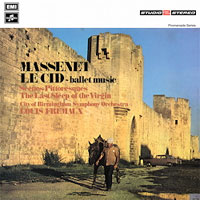Massenet • Le Cid
 side from his beautiful Meditation from Thais, the music
of Jules Massenet (1842-1912) is infrequently heard in concert halls and opera houses
these days, and that is a shame. If you are not familiar with his work, this Speakers
Corner reissue of Louis Fremaux and the CBSO’s EMI recording will serve as a great
introduction. Side one is devoted to the ballet music from the second act of
Massenet’s 1885 opera Le Cid. Each of the seven short movements is titled to
suggest melodies and dance styles from different regions of Spain. The exception to this
is "Aubade," whose name usually signifies a morning love song or poem. Massenet
scores this movement as a playful flute-and-piccolo duet. side from his beautiful Meditation from Thais, the music
of Jules Massenet (1842-1912) is infrequently heard in concert halls and opera houses
these days, and that is a shame. If you are not familiar with his work, this Speakers
Corner reissue of Louis Fremaux and the CBSO’s EMI recording will serve as a great
introduction. Side one is devoted to the ballet music from the second act of
Massenet’s 1885 opera Le Cid. Each of the seven short movements is titled to
suggest melodies and dance styles from different regions of Spain. The exception to this
is "Aubade," whose name usually signifies a morning love song or poem. Massenet
scores this movement as a playful flute-and-piccolo duet.
Side two begins with "Scénes Pittoresques," the fourth of Massenet’s seven orchestral suites. While each movement has its distinctive style or theme, the result is less overtly programmatic than Le Cid itself. Nevertheless, the tunes are pleasing and somewhat gentle, except for the boisterous brass fanfares in "fete Boheme." The last selection on side two, “The Last Sleep of the Virgin,” is from the oratorio La Vierge. Although Massenet’s career was extremely successful, La Vierge was poorly received. Despite its failure, this short selection from the oratorio, scored for orchestra and solo cello, was a huge hit. The liner notes report that Sir Thomas Beecham so loved “The Last Sleep of the Virgin” that he made it one of his “lollipops” -- favorite short pieces used for encores. The original EMI recording of this music was on The Absolute Sound’s Super Disk List for many years, but there is one flaw that no remastering can solve. The loud orchestral tutti sections have too much reverb, which masks some instrumental clarity. This has been a consistent criticism of the recording since its 1971 debut, but listening with headphones can make the problem less obtrusive. Actually, using headphones with this version is a joy, primarily due to the superbly quiet Pallas pressing. Sonic highlights include the smooth sound of the cellos, both in solo and section work. Their tone has a hint of warmth and the recording places them more forward in the soundstage without their being too close. Castanets are well captured in "Castillane," with their wooden “clack” sound accompanied by the distinct hollowness their cupped construction produces. Additionally, all woodwinds are well reproduced, with a special nod going to the sound of flutes and piccolos in the "Aubade" movement of Le Cid. From a musical point of view, the star of this recording is the woodwind section. Fremaux was able to shape the phrases and dynamics in such a pleasing fashion, holding the tempo back ever so slightly to emphasize phrase endings or points of melodic interest. This is particularly evident in "Analouse." By comparison, the Qobuz stream of the recording is less satisfying, tending to gloss over the interplay between sections of the orchestra. One more highlight is Fremaux’s solemn interpretation of “The Last Sleep of the Virgin," but one might wish for a bit more emotion in the solo cello performance. EMI’s original recording might have its sonic
faults, but Speakers Corner has done a good job of bringing out its musical strengths. The
quiet pressing allows fine details to come through for greater appreciation of
Massenet’s music and the CBSO’s excellent musicianship. The melodies might be
new to you, but you’ll feel you’ve known them all your life, and the
orchestration is both inventive and joyous. |
